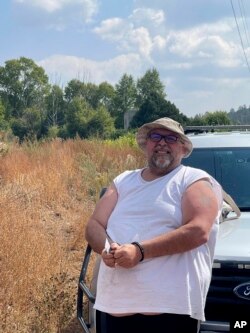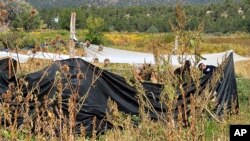A federal raid on a family marijuana backyard on tribal land in northern New Mexico is sowing uncertainty and resentment about U.S. drug enforcement priorities on Native American reservations, as extra states roll out authorized marketplaces for leisure pot gross sales.
In late September, Bureau of Indian Affairs officers confiscated 9 hashish vegetation from a house backyard at Picuris Pueblo that was tended by Charles Farden, a neighborhood resident since childhood who shouldn’t be Native American. The 54-year-old is enrolled within the state’s medical marijuana program to ease post-traumatic stress and anxiousness.
Farden mentioned he was startled to be positioned in handcuffs as federal officers seized mature vegetation laden with buds — an estimated yearlong private provide.
New Mexico first accredited the drug’s medical use in 2007, whereas Picuris Pueblo decriminalized medical pot for members in 2015. A brand new state legislation in June broadly legalized marijuana for adults and approved as much as a dozen home-grown vegetation per family for private use — with no weight restrict.
“I used to be simply open with the officer, easy. When he requested what I used to be rising, I mentioned, ‘My greens, my medical hashish,’ ” Farden mentioned of the Sept. 29 encounter. “And he was like, ‘That may be an issue.’ “
The raid has forged a shadow over hashish as an financial growth alternative for Indigenous communities, as tribal governments at Picuris Pueblo and no less than one different reservation pursue agreements with New Mexico that might permit them to open marijuana companies. The state is residence to 23 federally acknowledged Native American communities. It is aiming to launch retail pot gross sales by April.
Greater than two-thirds of states have legalized marijuana in some kind, together with 4 that accredited leisure pot within the 2020 election and 4 extra by laws this 12 months. The U.S. authorities has averted cracking down on them, though the drug stays unlawful below federal legislation to own, use or promote.
The September raid has some scrutinizing its method on tribal lands like Picuris Pueblo, the place the Bureau of Indian Affairs supplies policing to implement federal and tribal legal guidelines in an association frequent in Indian Nation. Different tribes function their very own police forces below contract with the BIA.
In a latest letter to Picuris Pueblo tribal Gov. Craig Quanchello obtained by The Related Press, a BIA particular agent in cost mentioned the company will not inform its officers to face down in Indian Nation — and that marijuana possession and rising stays a federal crime, regardless of adjustments in state and tribal legislation.
“Prior notification of legislation enforcement operations is usually not applicable,” the letter states. “The BIA Workplace of Justice Companies is obligated to implement federal legislation and doesn’t instruct its officers to ignore violations of federal legislation in Indian Nation.”
Officers with the BIA and its mum or dad company, the Inside Division, declined to remark and didn’t reply to the AP’s requests for particulars of the raid and its implications. Farden has not been charged and doesn’t know if there will probably be additional penalties.
President Joe Biden this week ordered a number of Cupboard departments to work collectively to fight human trafficking and crime on Native American lands, the place violent crime charges are greater than double the nationwide common.
He didn’t particularly deal with marijuana, although he has mentioned he helps decriminalizing the drug and expunging previous pot use convictions. He has not embraced federally legalizing marijuana.
Portland-based felony protection lawyer Leland Berger, who final 12 months suggested the Oglala Sioux Tribe after it handed a hashish ordinance, notes that Justice Division priorities for marijuana in Indian Nation have been outlined in writing below President Barack Obama then overturned below President Donald Trump, with little written public steerage since.
“It is outstanding for me to listen to that the BIA is implementing the federal Managed Substances Act on tribal land the place the tribe has enacted an ordinance that protects the exercise,” he mentioned.
Throughout the U.S., tribal enterprises have taken quite a lot of approaches as they straddle state and federal legislation and jurisdictional points to realize a foothold within the hashish business.
In Washington, the Suquamish Tribe cast a pioneering position below a 2015 compact with the state to open a retail marijuana outlet throughout Puget Sound from Seattle on the Port Madison reservation. It sells hashish from dozens of unbiased producers.
A number of Nevada tribes function their very own enforcement division to assist guarantee compliance with state- and tribal-authorized marijuana packages, together with a registry for home-grown medical marijuana. Taxes collected at tribal dispensaries stick with tribes and go towards neighborhood enchancment packages.
In South Dakota, the Oglala Sioux in early 2020 turned the one tribe to arrange a hashish market with out related state laws, endorsing medical and leisure use in a referendum on the Pine Ridge Reservation. Months later, a statewide vote legalized marijuana in South Dakota, with a problem from Republican Gov. Kristi Noem’s administration now pending on the state Supreme Court docket.
The U.S. authorities acknowledges an “inherent and inalienable” proper to self-governance by Native American tribes. However federal legislation enforcement companies nonetheless selectively intervene to implement hashish prohibition, Berger mentioned.
“The tribes are sovereign nations, they usually have treaties with america, and in some circumstances there may be concurrent jurisdiction. … It is kind of this hybrid,” he mentioned.
In late 2020, a mixture of state, federal and tribal legislation enforcement cooperated in a raid on sprawling marijuana farms with makeshift greenhouses in northwestern New Mexico with the consent of the Navajo Nation president. Authorities seized greater than 200,000 vegetation. On the time, New Mexico restricted marijuana cultivation to 1,750 vegetation per licensed medical hashish producer.
At Picuris Pueblo, Quanchello mentioned the hashish business holds financial promise for tribal lands which might be too distant to assist a full-blown on line casino. Picuris operates a smoke store out of a roadside trailer and is near opening a fuel station with a sandwich store and mini-grocery.
“We’re farmers by nature. It is one thing we are able to do right here and be good at it,” Quanchello mentioned. “We do not need to miss it.”
He described the BIA raid as an affront to Picuris Pueblo, with echoes of federal enforcement in 2018 that uprooted about 35 hashish vegetation grown by the tribe in a foray into medical marijuana.
State lawmakers in 2019 adopted uniform laws for medical marijuana on tribal and nontribal land.
In legalizing leisure marijuana this 12 months, New Mexico’s Democratic-led Legislature and Gov. Michelle Lujan Grisham emphasised the necessity to create jobs, shore up state income and deal with issues about hurt inflicted on racial and ethnic minorities by drug criminalization.
Judith Dworkin, a Scottsdale, Arizona-based lawyer specializing in Native American legislation, mentioned tribal hashish enterprises confront much less threat of interference from federal legislation enforcement the place states have strong authorized markets for pot.
“It is rather a lot simpler for a tribe to take a place that they need to do one thing related” to the state, she mentioned. “It is nonetheless a threat.”
Quanchello mentioned he sees federal enforcement of hashish legal guidelines at Picuris Pueblo as unpredictable and discriminatory.
“We as a tribe can find yourself investing one million {dollars} right into a undertaking, considering it is OK. And due to a rogue officer or someone that does not imagine one thing is true, it may very well be stopped,” he mentioned.













